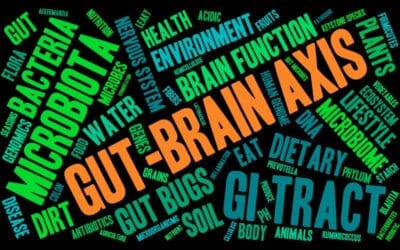Last Updated on February 3, 2024 by
Alternative to Meds Editorial Team
Medically Reviewed by Dr Samuel Lee MD
Table of Contents:

Last Updated on February 3, 2024 by
Alternative to Meds Editorial Team
Medically Reviewed by Dr Samuel Lee MD

Within the gut, there are trillions of microorganisms, including bacteria, fungi, protozoa, and viruses of thousands of different species. It’s this busy group of microorganisms in the gut that makes up what’s known as the microbiome. These microscopic “bugs” are mostly found in the small and large intestines but can be located in other parts of the body as well.
The “bugs” that make up the microbiome are a mix of both good and bad, or helpful and harmful critters, and each person has their own individual mix that’s unique to them. A person’s unique combination of microbiota is determined by their DNA and can be affected through the birth process and by their mother’s milk. Later in life, diet, environmental factors, and other conditions can also affect the balance of the microbiome.

One of these essential processes that our body performs is metabolism. Our metabolism is responsible for how our body breaks down and absorbs nutrients from the food we eat. The gut microbiome is not only responsible for the digestion of these nutrients but the actual metabolic pathways they will go through. So, everything from reading neurotransmitters to sending signals to the brain and a variety of other bodily functions is affected by the microbiome of the gut.
Because the microbiome is so intricately related to so many different bodily processes and overall health, slight disruptions to the balance of the microbiota can have some consequences for personal health. One example of this is taking antibiotics. These drugs are often prescribed for various infections in the body and help to get rid of the bad bacteria. However, they often also kill off strains of good bacteria living in the gut, making us feel unwell in other ways.
Additionally, many autoimmune disorders, including diabetes, multiple sclerosis, rheumatoid arthritis, muscular dystrophy, and fibromyalgia may all be linked to disruptions in the microbiome. These disorders present themselves when an abundance of disease-causing flora in the gut changes the gene activity and metabolic processes, leading to abnormal responses to body tissues, or what’s known as autoimmune disorders.
The kinds of foods we eat, as well as the prescription drugs we take, and many other environmental factors affect the ability of the trillions of bacteria in the microbiome to carry out these vital processes, ultimately disrupting the signals being sent to the brain to function properly. This is the gut-brain connection that can affect a person’s mental health too.
A growing body of evidence shows that there is a direct correlation between the gut microbiome and the brain. These two systems communicate through the bacteria in the gut that send signals to the brain through the various metabolic pathways of the body.
Through analyzing the different strains of bacteria in the gut microbiome, research indicates that we can unlock key components to various mental health disorders. According to an article published by Frontiers in Psychiatry in 2020, there are numerous correlations between psychosis and the gut microbiome.
In this study, researchers worked with both people with and without mental illnesses and studied the microbiomes of each group. The findings were that there are stark differences between the bacteria of those with mental illness compared to those without.
Not only were there different kinds of bacteria in each group, but in the group with mental illness, the gut microbiomes showed less varying strains of bacteria than those without mental illness. This can potentially indicate that what we eat and how our gut microbiome can break down food can affect our mental health through the neurotransmitters from the gut to the brain.
So, by possibly adjusting the bacteria and other flora in the gut microbiome, research indicates that we may be able to treat various mental disorders through what we eat, as well as controlling other environmental factors that can affect the microbiota.
Another journal article published in Current Psychiatry Reports supports these findings through data of their own. They found evidence that the gut microbiota is heavily involved in inflammation, the digestion process itself, and gut permeability. The varying degrees of bacteria in the gut influence gluten digestion inefficiencies, of which inflammatory permeability can be a risk factor for Schizophrenia.
What we eat affects everything from how our bodies work to how well they work too. Repairing our body from the inside out starts with the microbiome. This has the potential to reduce the risks of all sorts of diseases and disorders like obesity, diabetes, cancer, heart disease, and mental health conditions.
Choosing to eat foods such as yogurt with active cultures, fiber-rich foods, avocados, nuts, and dark leafy greens, as well as drinking plenty of water all help to create the best environment for your gut microbiome.
Processed foods are what make the bacteria of the gut microbiome work against the body instead of for the body.10-12
These are the kinds of foods that many people commonly eat every day but are actually making their gut microbiome work more inefficiently. Avoiding eating foods such as these gives the gut microbiome a better chance to thrive and function.
A diet rich in good-for-you fats is great for supporting the gut microbiome environment. Now, this doesn’t mean that it’s ok to just eat fried, high-fat foods. However, foods rich in healthy fats and omega-3s support the microbiome, aid in the digestive processes, and help support brain function, cognition, and help to regulate emotions. Healthier fats are key to keeping the brain healthy and promoting mental health.
Adding fermented foods can be a great way to introduce new bacteria strains to the gut’s microbiome. Fermented foods contain the good bacteria that our bodies need to break down foods and contribute to healthy bodily processes.4-9
These fermented foods help to maintain the balance of healthy gut flora that can contribute to overall physical and mental health.
Nutrition is one easy way to alter the microbiota that make up the gut microbiome. Adhering to a low-carb, chemical and pesticide-free organic-based diet is what may be best for the gut microbiome and overall physical and mental health. Eating a diet rich in non-starchy vegetables, ancient and sprouted grains, and fermented foods can help make the bacteria in the gut microbiome diverse, and this diversity is key in altering the gut-brain connection. Research has shown that following this diet can change the gut microbiome and, in some cases, successfully put Schizophrenia into remission.1-3
At Alternative to Meds Center, we believe in holistic health and utilize a wide variety of natural health practices for holistic care. We work with you in creating an individualized treatment plan that may involve diet, counseling, yoga, reiki, neurotoxin removal, and many other additional therapies.
1. Kraeuter A-K, et al, The Gut Microbiome in Psychosis From Mice to Men: A Systematic Review of Preclinical and Clinical Studies, Frontiers In Psychiatry, 2020 Aug 11 [cited 2022 May 9]
2. Nguyen TT, et al, Gut microbiome in serious mental illnesses: A systematic review and critical evaluation PubMed, 2021 Mar 5 [cited 2022 May 9]
3. Severance EG, et al, Autoimmune diseases, gastrointestinal disorders and the microbiome in schizophrenia: more than a gut feeling, PubMed, Schizophrenia Research, 2016 Sep [cited 2022 May 9]
4. Microbes and brain share neurochemistry, Lundbeck Institute, 2019 Mar 6 [cited 2022 May 9]
5. Yeager A, Gut Microbes May Play a Role in Mental Health Disorders The Scientist, 2019 Jul 5 [cited 2022 May 9]
6. Järbrink-Sehgal E, Andreasson A. The gut microbiota and mental health in adults. Curr Opin Neurobiol. 2020 Jun;62:102-114. doi: 10.1016/j.conb.2020.01.016. Epub 2020 Mar 9. PMID: 32163822.
7. The Human Microbiome, Center for Ecogenetics and Environmental Health, University of Washington [cited 2022 May 9]
8. Butler MI, Sandhu K, Cryan JF, Dinan TG. From isoniazid to psychobiotics: the gut microbiome as a new antidepressant target. Br J Hosp Med (Lond). 2019 Mar 2;80(3):139-145. doi: 10.12968/hmed.2019.80.3.139. PMID: 30860919. [cited 2022 May 9]
9. Aslam H, Green J, Jacka FN, Collier F, Berk M, Pasco J, Dawson SL. Fermented foods, the gut and mental health: a mechanistic overview with implications for depression and anxiety. Nutr Neurosci. 2020 Sep;23(9):659-671. doi: 10.1080/1028415X.2018.1544332. Epub 2018 Nov 11. PMID: 30415609. [cited 2022 May 9]
10. Jacques A, Chaaya N, Beecher K, Ali SA, Belmer A, Bartlett S. The impact of sugar consumption on stress driven, emotional and addictive behaviors. Neurosci Biobehav Rev. 2019 Aug;103:178-199. doi: 10.1016/j.neubiorev.2019.05.021. Epub 2019 May 21. PMID: 31125634. [cited 2022 May 9]
11. Lachance L, Ramsey D. Food, mood, and brain health: implications for the modern clinician. Mo Med. 2015;112(2):111-115. [cited 2022 May 9]
12. Millichap JG, Yee MM. The diet factor in attention-deficit/hyperactivity disorder. Pediatrics. 2012 Feb;129(2):330-7. doi: 10.1542/peds.2011-2199. Epub 2012 Jan 9. PMID: 22232312. [cited 2022 May 9]
Originally Published March 3, 2021 by Lyle Murphy

Dr. Samuel Lee is a board-certified psychiatrist, specializing in a spiritually-based mental health discipline and integrative approaches. He graduated with an MD at Loma Linda University School of Medicine and did a residency in psychiatry at Cedars-Sinai Medical Center and University of Washington School of Medicine in Seattle. He has also been an inpatient adult psychiatrist at Kaweah Delta Mental Health Hospital and the primary attending geriatric psychiatrist at the Auerbach Inpatient Psychiatric Jewish Home Hospital. In addition, he served as the general adult outpatient psychiatrist at Kaiser Permanente. He is board-certified in psychiatry and neurology and has a B.A. Magna Cum Laude in Religion from Pacific Union College. His specialty is in natural healing techniques that promote the body’s innate ability to heal itself.

Lyle Murphy is the founder of the Alternative to Meds Center, a licensed residential program that helps people overcome dependence on psychiatric medication and addiction issues using holistic and psychotherapeutic methods.
Can you imagine being free from medications, addictive drugs, and alcohol? This is our goal and we are proving it is possible every day!
Read All StoriesView All Videos